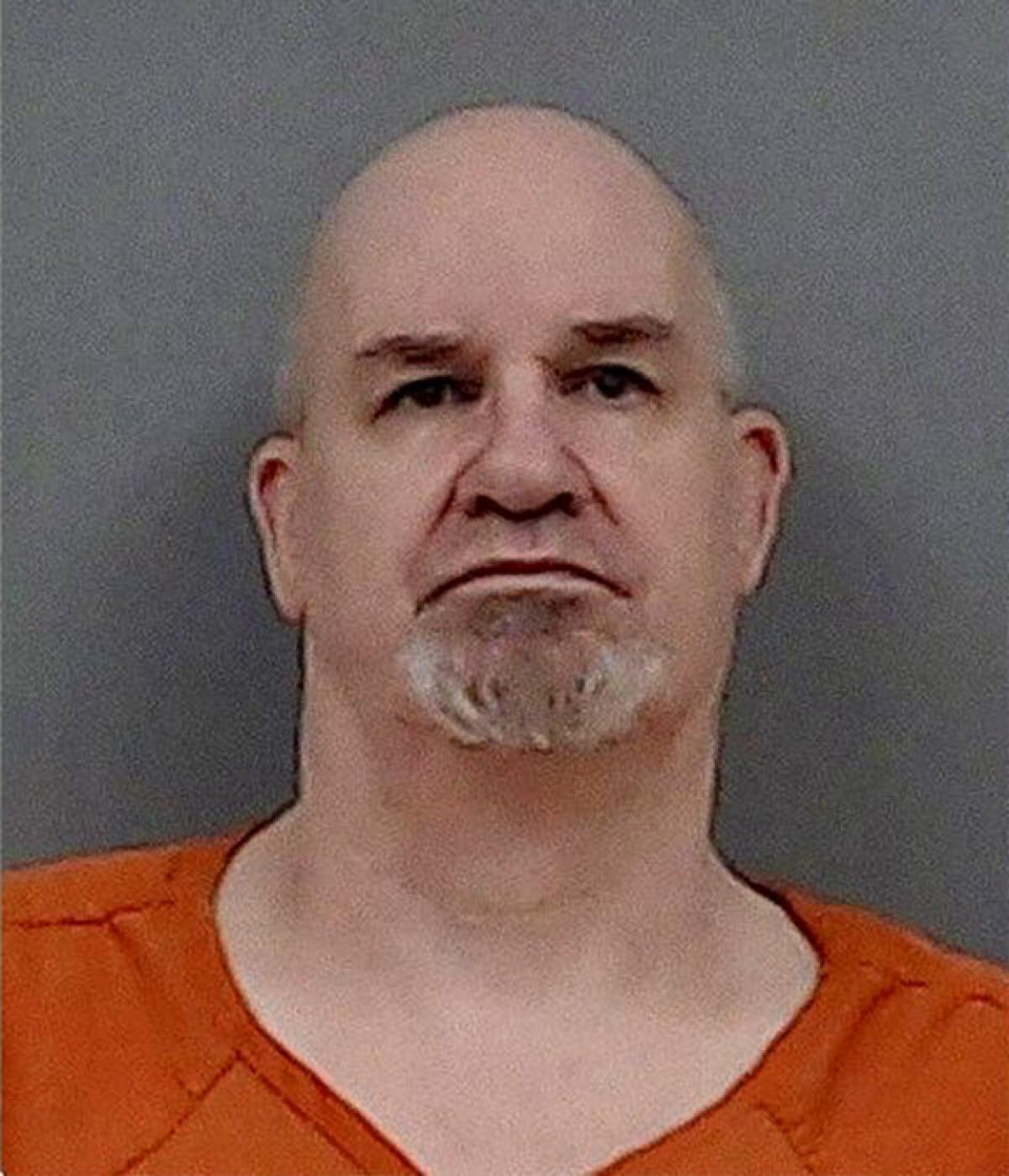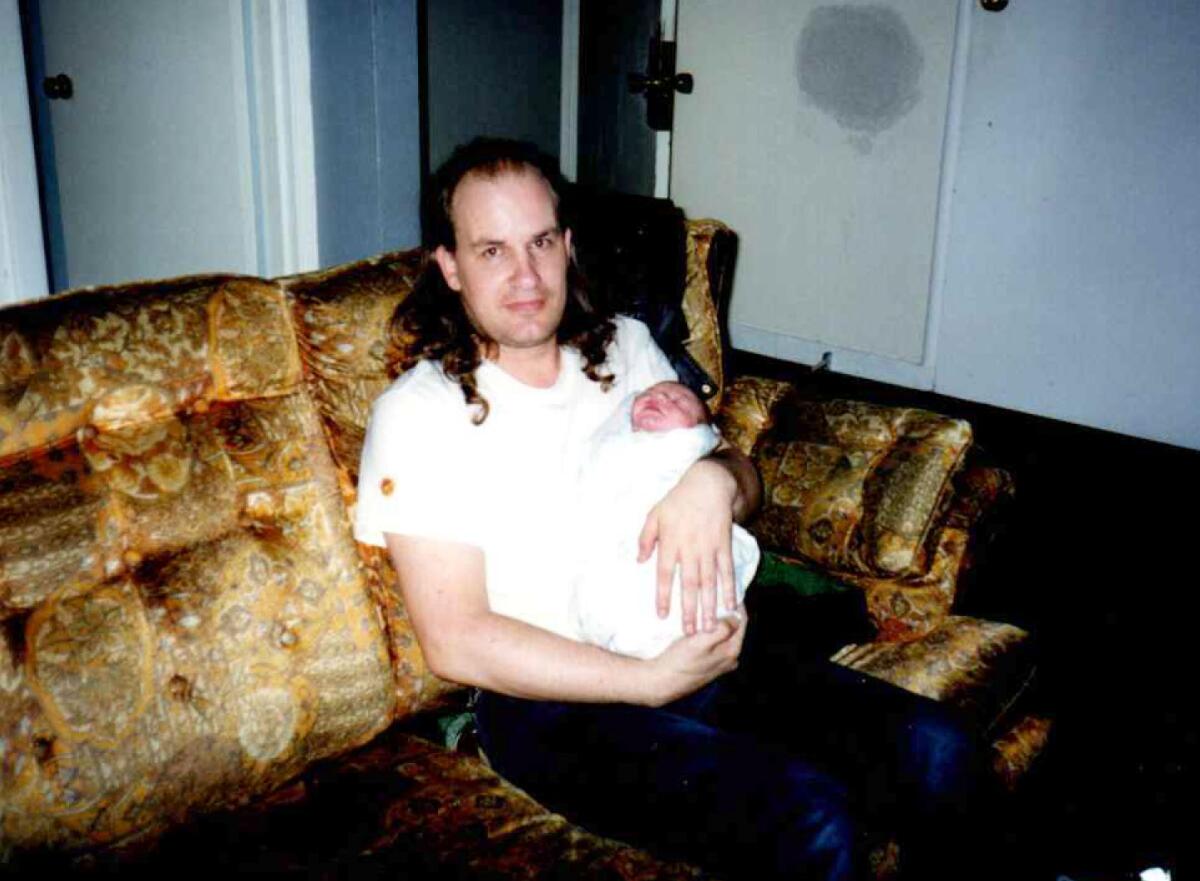A thief stole his identity, but nobody believed him. He spent nearly 2 years locked up

- Share via
Nobody believed William Woods.
They didn’t believe someone had used his Social Security number to run up hundreds of thousands of dollars in debt. They didn’t believe the Social Security card he himself carried was real.
Above all, no one believed he really was William Woods.
He was arrested for unauthorized use of personal information and spent nearly two years locked up awaiting trial, including more than 100 days in a psychiatric hospital. Woods eventually pleaded no contest in a Los Angeles court to identity theft and false impersonation in exchange for a time-served sentence and immediate release from custody.
Woods had never pretended to be anyone but himself. The problem, it turned out, was that someone had spent decades pretending to be Woods.

Last week, the culprit — Matthew David Keirans — pleaded guilty to making a false statement to a National Credit Union Administration insured institution and aggravated identity theft, according to the U.S. Attorney’s Office for the Northern District of Iowa.
The 58-year-old faces up to 32 years in prison.
A spokesperson for the Los Angeles Police Department, which arrested Woods back in 2019, said the department is aware of the case and is “actively investigating.”
Venusse Dunn, a spokeswoman for the Los Angeles County district attorney, said the office has filed a motion to vacate Woods’ conviction. The hearing is scheduled for April 11.
In a recent interview with The Times, Woods said he’s considering filing a lawsuit against the city of L.A. for the years he spent behind bars, accused of a crime he did not commit.
“They should pay for every day I had to stay there,” the 55-year-old said. “It isn’t right to be putting me in jail for nothing.”
A stolen identity
The scam began four decades ago at a hot dog cart in Albuquerque, N.M.
Woods had been working there for years, he said, when Keirans was hired in 1988. The men didn’t interact until Woods’ wallet went missing. When Woods questioned Keirans about the theft, he said, the other man didn’t respond.
“I put my fist in his face, and he decided to hand me back my wallet,” said Woods, although he didn’t hit Keirans.
Woods said he looked inside the wallet and his Social Security card and birth certificate were still inside.
“I didn’t think anything of it,” Woods said. “I didn’t think he was actually going to do anything.”
But, after 1988, there was no record of Keirans ever using his own name, date of birth or Social Security number, according to his plea agreement.
Instead, Keirans obtained employment, insurance, a Social Security number, driver’s licenses, titles, loans and credit using Woods’ identity. He even paid taxes under his former coworker’s name.
In December 1990, Keirans got a Colorado ID card as Woods. Then he got a job at a fast food restaurant and opened a new bank account, all using the stolen identity.
The following September, Keirans, posing as Woods, bought a car for $600 using checks that later bounced, according to the agreement. As a result, an arrest warrant was issued for Woods.
Keirans’ fiction extended to his personal life. He married in 1994. The couple had a child in Oregon who bore Woods’ last name. To keep his charade going, Keirans in 2012 obtained Woods’ certified birth certificate from Kentucky, using information from Ancestry.com, according to prosecutors.

He later got a job — as Woods — working as a systems architect at the University of Iowa Hospitals and Clinics. Keirans provided the hospital with fake identification documents, including a fictitious I-9 form, Social Security number and date of birth, according to the plea agreement.
Keirans worked remotely from his home in Wisconsin and earned at least $700,000 from the hospital over a 10-year period. Between 2016 and 2022, he obtained vehicle and personal loans from credit unions under Woods’ name, totaling more than $200,000.
The real William Woods
As the fake Woods seemed to thrive, the real one struggled.
After leaving New Mexico, Woods said he worked as a day laborer in El Paso then got a job at a laundromat in Las Vegas. Eventually, he moved to Southern California.
He spent several years in San Diego, where he said he worked a tech job, before moving to Santa Monica in 2009. He stayed in hotels and motels around the area and said he sold gem stones, gold scraps or other items he found on the streets of downtown L.A.’s jewelry district.

On Aug. 20, 2019, Woods, whom prosecutors described as homeless, went to an L.A. branch of a national bank and told the assistant branch manager that he’d recently discovered someone was using his credit and had accumulated a large amount of debt, according to Keirans’ plea agreement. Woods requested his account numbers so he could close them.
Woods gave the assistant branch manager his Social Security card and his California ID. His name and Social Security number matched those associated with bank accounts Keirans had opened. Because of the large amounts of money in the accounts, the bank employee asked Woods a series of security questions, which he was unable to answer correctly, according to court records.
The bank employee then called the number tied to the bank accounts. Keirans answered. He told her no one in California should have access to his bank account. He correctly answered the security questions. The assistant branch manager called the police.
LAPD officers spoke with Keirans on the phone, and he later faxed them a copy of a Social Security card, a Wisconsin driver’s license and the Kentucky birth certificate. The officers arrested Woods for unauthorized use of personal information.
On Oct. 31, the district attorney’s office charged Woods with two felonies, in the name of “Matthew Kierans” — misspelling the real identity thief’s last name. That day in court, according to court reporter transcripts obtained by The Times, Woods told the judge, “I’m not Matthew Keirans at all.” It is unclear how Woods was linked to the identity thief’s name.
The prosecutor’s office said the case had been filed under a previous administration based on police reports as well as body-worn camera video. As to why Woods was booked under the name “Kierans,” a spokesperson for the office said that was “unclear”; the LAPD did not specify how that came to happen.
Two months later, Woods again told the court, “No, I’m not Keirans at all.” He asked for another attorney. He said he wanted an investigator. He didn’t make sense at times, saying the investigator was in Mexico and that he received a password, according to the transcript.
“I’m sorry. Stop. You’ve got to stop,” the judge told Woods, before pulling the lawyers aside.
“Your Honor, based on my conversations with my client, and at this time, I do not believe that he is competent, and I’m declaring a doubt,” Susana Juarez, Deputy Alternate Public Defender, said soon after.
The judge suspended criminal proceedings and said a psychiatrist would be appointed.
“I want to talk to the FBI,” Woods said.
“You can give them a call,” the judge replied.
“I want some agents to come down here,” Woods said.
In February 2020, the judge found Woods was not mentally competent to stand trial and ordered him to a psychiatric hospital. It was also ordered that he receive psychotropic medication.
A little more than eight months later, after numerous delays because of bedspace and COVID-19 issues, Woods was transported to Patton State Hospital, according to a minute order from the court.
“People didn’t listen, and they didn’t know I was who I said I was,” Woods said. “They were painting it like I was crazy.”
Throughout that time, according to the plea agreement, Keirans kept writing to L.A. authorities, requesting updates on the case.
In March 2020, he wrote the assistant district attorney and asked whether the process was moving forward and if there would be court hearings every two months to determine competence. The assistant district attorney confirmed that to be the case “until he regains competency.”
“This is assuming he does,” Keirans responded, according to the plea agreement.
Woods was convicted of felony charges in March 2021. He pleaded “no contest” and was sentenced to two years of imprisonment in the county jail, although the court credited him for the 428 days he spent in jail and the 147 days he spent in the hospital.
He was ordered to stop using the name William Woods.
Woods said he pleaded out so the case against him would be dismissed.
“At first I kept saying, ‘I’m not guilty,’ but they wouldn’t believe that,” Woods said. “They wouldn’t believe it.”
A DNA test
After his release, Woods was determined to get back his identity.

In August 2021, he contacted the local police department in Wisconsin and reported that Keirans had stolen his identity, according to the plea agreement. That same month, Keirans filed a complaint falsely claiming that Woods had stolen his identity.
Woods then filed customer disputes in an attempt to clear his credit report, according to the agreement. Keirans filed a second identity theft complaint with the local police and later submitted a notarized statement in support of his claim.
In January 2023, Woods learned where Keirans worked and contacted the Iowa City hospital’s security department. They referred his complaint to the University of Iowa Police Department.
Detective Ian Mallory obtained DNA from Woods and his father, listed on the Kentucky birth certificate. The test proved that Woods was his father’s son.
When Mallory interviewed Keirans, he told Mallory that Woods was “crazy” and “needed help and should be locked up.” Mallory asked Keirans for his father’s name and Keirans mistakenly gave the first name of his own adoptive father, according to the plea agreement.
Mallory then confronted Keirans with the DNA evidence. Keirans responded by saying, “my life is over,” and “everything is gone.”
Keirans pleaded guilty April 1 in federal court in Cedar Rapids, Iowa. He remains in custody of the United States Marshal pending sentencing. The case was first reported in the Cedar Rapids Gazette.
In a letter written to the court on Keirans’ behalf, his son identified himself as the “son of Matthew Keirans, formerly known as William Woods — in either case, known to me as Dad.”
Starting over
In a rambling phone interview, Woods floated theories about what happened to him and why — most of which The Times could not confirm.
Woods spoke of corrupt cops and politicians across the country. He insisted that LAPD officers had known he was the real Woods and conspired with the banker to “put me in jail on purpose.”
When asked about Woods’ claims, an LAPD spokeswoman cited the investigation and said “additional information regarding this case is not currently available.”
Eric Kilmer, who had employed Woods at his hot dog cart business starting in the 1980s, described him as “the most innocent type fellow you’ll ever want to meet.” He added that people would take advantage of Woods.
At times, he said, Woods has rambled off names, some of people Kilmer knows and others he doesn’t.
“I think that since people were taking advantage of him over time, all these names stick in his head,” Kilmer told The Times. “He’s just trying to tie it all together in his own mind, I think.”
Last year, Woods moved back to Albuquerque, where he lived in a hotel. He’s currently staying in a friend’s van in El Paso.
Woods said he doesn’t know yet what he’ll be doing for work.
“What’s next for me?” he asked. “I guess I have to regain all my stuff back and just rebuild what I was.”
More to Read
Sign up for Essential California
The most important California stories and recommendations in your inbox every morning.
You may occasionally receive promotional content from the Los Angeles Times.














